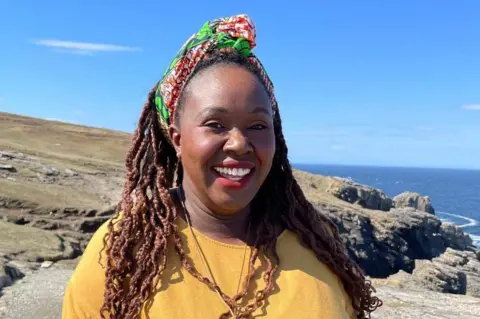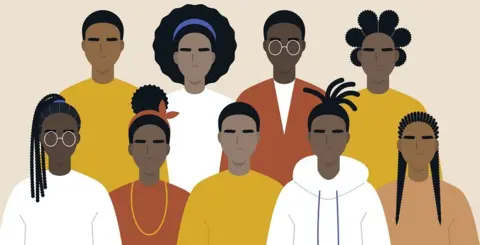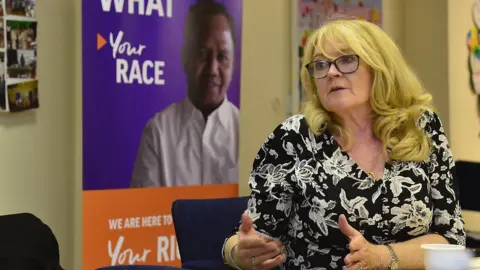Racism in Northern Ireland 'feels like a blade'
 Maureen Hamblin
Maureen Hamblin"If every person of colour reported racism, people would be shocked at the horrific stuff that happens."
Maureen Hamblin, a mother-of-three living outside Belfast, has spoken out about her experiences of racism, which she says occurs on a regular basis.
She said she had witnessed a change in attitudes in Northern Ireland since the Brexit referendum in 2016.
"What Brexit did for me was to show me the closet racists, because they couldn't hide anymore."
Warning: Contains language some people may find offensive
Born in Kenya, Ms Hamblin moved to Dublin when she was 12 and then to Belfast in 2014.
In the latest incident, she said a crowd of young men followed her and her sons, shouting racial slurs and making monkey noises.
She posted a video online following the incident in Hazelbank Park in Newtownabbey, County Antrim, last week.
Police have confirmed they are investigating a report of a race-motivated hate incident in the area, adding that there was "no place for hate and we take reports of this nature incredibly seriously".
Ms Hamblin said the incident was not a new occurrence.
"The last time something like that happened to me was three years ago, when I was pregnant with my youngest," she said.
"I was walking in Orangefield Park. They called me the 'N-word' and cycled really close to me and I almost fell in the stream."
Microaggressions
Living in Northern Ireland, Ms Hamblin said she encountered "microaggressions" on a daily basis.
She explained that it is the smaller acts of racism that "feel like a blade".
"It's the little things, it's the not being welcome, it's the little comments - especially about my hair and just people saying really insensitive things," she said.
 Nadia Bormotova
Nadia BormotovaShe said she had experienced people pointing and laughing at her natural afro hairstyle, strangers gripping their purses when they see her and others "just straight up talking about me, as if I wasn't there".
She feels there is a misperception of black women moving to Ireland to have children and receiving government support - which Mrs Hamblin believes is the reason she experiences higher levels of racism when she is in public with her sons.
During her second pregnancy, an estate agent challenged Mrs Hamblin's income when she told him she did not receive any state benefits.
"He told me 'I don't believe that,'" she said.
'Uncomfortable truths'
Mrs Hamblin's story comes as the Equality Commission publishes new research that suggests racism is a part of tolerated life for many living in Northern Ireland.
Researchers surveyed 55 people from ethnic minority and migrant backgrounds who found attitudes to them in Northern Ireland were perceived to have worsened after Brexit.
The participants of the study also found their rights and entitlements had become more complicated since the referendum and they didn't feel like they were a priority for the government of Northern Ireland.
 Equality Commission
Equality Commission"It is disturbing that the most striking findings of this recent research are that people from minority ethnic and migrant groups said that racism was a normal part of their daily life in Northern Ireland and that women are particularly exposed to racism," said chief commissioner Geraldine McGahey.
"We know racism is not new to Northern Ireland, and its impact is devastating," she said.
"The findings of this research report and our ongoing work with the sector make for uncomfortable truths."
Emboldening of people
Mrs Hamblin said Brexit showed what she called "the closet racists" coming out.
"It was almost as if they were like 'we're going to go crazy', and the rise of political leaders who were not scared to really make that a thing," she said.
She explained that she would have previously experienced racism from groups of teenagers and people from lower socio-economic areas, "but now you're literally not safe anywhere".
"There's an emboldening of people to just do and say whatever they like," she added.
The incident at Hazelbank Park was her first logged complaint with the Police Service of Northern Ireland, but she said she felt it necessary to speak up and raise awareness.
"I'm scared to go to places now," she said.
"I just want a better life for my kids and for myself because I have made the island of Ireland my home."
If you have been affected by any of the issues in this story you can contact the BBC Action Line.
